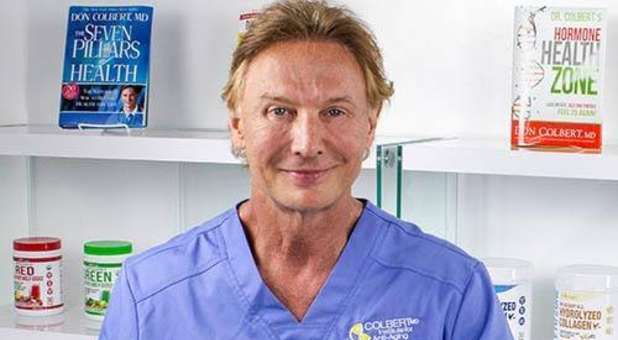Dr. Don Colbert Shares Vital Yet Often Overlooked Key to Holistic Health
In his newest book release, Dr. Colbert’s Healthy Gut Zone, Dr. Colbert states that if adults would work to restore their gut health and eat the same gut-friendly foods, it is likely every single person would see improvement. Most symptoms would probably disappear and any sicknesses and diseases along with them.
“That is how powerful the gut is,” Colbert says. “Once it is restored, it can put the rest of your body back together again. Of the five power tools I recommend for improving your gut health—fiber, probiotics, prebiotics, polyphenols and resistant starches—fiber is one of the most important, and adding more of it into your diet is a good place to start in healing your gut.”
As a physician who has helped an untold number of patients make the journey from disease to health, bestselling author Don Colbert, M.D., explains in his new book, Dr. Colbert’s Healthy Gut Zone, without hesitation that fantastic health benefits are realized when the gut heals itself.
Colbert helps readers “unlearn” everything medical experts have been teaching about healthy eating for the last three decades and reveals the true path to digestive health through proper diet supported by nutritional supplements. Colbert’s book, which was released on Jan. 5, 2021, is available through Amazon, Barnes and Noble, BAM, Christianbook.com, Indiebound and Walmart.
Colbert writes, “A significant gut power tool is plain old fiber—not beans, wheat bran or grain-based fibers that are full of lectins—but psyllium husk powder. It plays an amazingly vital role in restoring your gut health. It is also very inexpensive, which makes it available to everyone.”
Technically, fiber comes in two different forms: soluble and insoluble. Colbert explains that the body needs both. “Soluble fiber dissolves in your GI tract, absorbs water and helps with digestion. As you see below, most of these fibers are typically not gut friendly. Sources of soluble fiber include these: apples, barley, beans, carrots, citrus fruits, oats, peas and psyllium.
“Insoluble fiber does not dissolve in your GI tract. It passes through, helps keep you regular and pushes food through the GI tract. Sources of insoluble fiber include beans, cauliflower, green beans, nuts, potatoes, wheat bran and whole-wheat flour.”
Colbert continues, “Eating fruit to get fiber means eating fruit sugars, and any sugar feeds the bad bacteria in your gut. At first, I would not recommend fiber from fruit, except for berries (one-quarter to one-half cup a day), which are low in sugar and high in polyphenols. Carrots and apples also have sugar, though they contain much less than citrus fruits do.”
In Dr. Colbert’s Healthy Gut Zone, Colbert explains that eating beans, peas, barley, whole wheat, wheat bran and potatoes to get fiber means eating lectins, gluten and starch. “That is not good for your gut wall,” he writes. “Pressure-cooking beans and peas properly to remove lectins, after one or two months of avoidance, is a good plan, but I would stay completely away from gluten. I encourage you to get your fiber from other sources such as veggies, berries and perhaps psyllium husk powder, if you do not experience gas or bloating.”
Readers may wonder then how to get enough fiber in their diet. Colbert recommends psyllium husk powder. “Psyllium is mainly a soluble fiber with some insoluble fiber from the seed husks of the plant plantago ovata. Many laxative or fiber mixes claim to provide your body with the fiber it needs. Though that might be true, it is the other ingredients (especially sugars and artificial sweeteners) that concern me.”
For more insoluble fiber intake, Colbert suggests nuts or nut butters, artichoke, cauliflower, broccoli and other cruciferous veggies. For the veggies, it is the stems that have the most insoluble fiber, so be sure to eat those as well.
“Fiber is often called ‘roughage’ or ‘bulk,’ but it is far more than that,” Colbert explains. “Your body desperately needs sufficient fiber every day, but most people are getting less than half the fiber they need.”
Some individuals notice that their cholesterol levels decrease 10-20% after a few months of psyllium fiber. Lower blood pressure levels and blood sugar levels are also common with Dr. Colbert’s patients, which makes sense because soluble fiber supports healthy cholesterol and blood sugar levels. It also helps control appetite, which helps lower weight, thus lowering blood pressure.
“Psyllium husk powder is usually soothing to the gut and brings with it many intrinsic healing properties, regardless of your symptoms or disease,” Colbert states. “Be sure to start low and go slow if you aren’t accustomed to using it. Your gut needs the many benefits of fiber, but if it takes you a while to get there, that is fine. Just be sure to incorporate this important power tool into your diet right away!” {eoa}
Don Colbert, MD, was a board-certified family practice doctor for more than 25 years in Orlando, Florida, and most recently in Dallas, Texas. He is also board-certified in antiaging medicine through the American Academy of Anti-Aging Medicine and has received extensive training in nutritional and preventative medicine. He is the author of three New York Times bestselling books, including Let Food Be Your Medicine, The Seven Pillars of Health and Dr. Colbert’s “I Can Do This” Diet, along with bestsellers Toxic Relief, the Bible Cure series, Living in Divine Health and Stress Less. He has sold more than 10 million books and treated more than 50 thousand patients in his years of practicing medicine.
Dr. Colbert’s Healthy Gut Zone is published by Siloam, an imprint of Charisma House.
Follow breaking news like this and more in our new platform, CHARISMA PLUS.















































